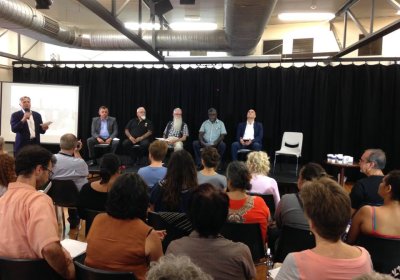It was standing room only at the Men Speak Out For Treaty forum held in the Redfern Community Centre on March 14 organised by the Stop the Intervention Collective Sydney. The meeting was facilitated by journalist and filmmaker Jeff McMullen.
Wiri Man Tony McAvoy argued that a treaty would settle past injustices and build a better future. A treaty would have to include an acknowledgement that Australia was conquered not settled, and recognition of Aboriginal rights to self-determination.
Northern Territory Intervention (NTER)
Every year it becomes harder to ignore official Australia's celebrations of nationalism. For weeks, supermarket aisles have been given over to garish displays of things to buy for Australia Day on January 26: Australian flags and hats, stubby holders and thongs displaying Australian flags.
None of it would look out of place at a Reclaim Australia rally.
And then there is that ad for lamb featuring popular SBS broadcaster Lee Lin Chin. It is tongue-in-cheek, for sure, showing a military operation to enforce Australians worldwide to barbecue lamb for Australia Day.
The Intervention: An Anthology
Edited By Rosie Scott & Anita Heiss
Concerned Australians, 2015
$25
“The Intervention to us was like Australia declaring war on us and in the process they demonised and dehumanised Aboriginal men, women and children,” says Rosalie Kunoth-Monks, Aboriginal elder and 2015 Northern Territory Australian of the Year.
"Another bloody bogan. Shows she can't manage her money", the Coles cashier said as Sally left the store. It was Sally's first time using the Basics Card, and things were not off to a good start.
Protesters in Sydney marked the eighth anniversary of the Northern Territory Intervention — renamed Stronger Futures — with a rally at Town Hall and march to the Block in Redfern on June 21.
Speakers at the protest included Ken Canning, Albert Hartnett, Eva Cox, Gerry Georgatos and Kyol Blakeney.
Paddy Gibson spoke at a Stop the Intervention Collective public meeting in April on the Northern Territory Intervention and Western Australian community closures. Gibson has lived in Alice Springs, researching the impact of the Intervention. He is a senior researcher with the Jumbunna Indigenous House of Learning, University of Technology Sydney and co-editor of Solidarity magazine. This is an edited version of his speech.
* * *
Stop the Intervention Collective (STICS) held a forum last month to update participants on the NT Intervention.
Dr Shelley Bielefeld, lecturer in law at UWS, visiting scholar at Jumbunna Indigenous House of Learning at UTS and the Centre for Aboriginal Economic Policy Research at ANU, spoke at the forum. Afterwards she spoke to Green Left Weekly.
* * *
How does the government justify the Intervention?
More than 150 people filled the Redfern Community Centre on March 20 to discuss a treaty for Australia’s first people.
Organised by Stop the Intervention Collective Sydney (STICS), the event was hosted by veteran journalist Jeff McMullen and televised by National Indigenous TV. As coverage of female Aboriginal voices are rare among mainstream discourses, their retelling of their pasts and hopes for the future captivated the room.
It has been seven years since the federal government introduced the Northern Territory intervention. To mark the date, a protest was held outside Alice Springs courthouse on June 21, demanding an end to the intervention, now known as Stronger Futures, and an end to income management.
SOMETIMES in life, you can feel pretty helpless. That said, I’m a privileged white guy in a privileged white society. So for me at least, it doesn’t happen very often.
It happened last year.
John Pilger is a journalist I grew up reading, and a large part of the reason why I entered journalism. Pilger was back in Australia making Utopia, his fourth film about the plight of Aboriginal Australians. He asked me to work on it with him.
A protest against racism outside Labor MP Tanya Plibersek's office on March 21 demanded an end to the Northern Territory intervention and its expansion into areas such as Bankstown in south-west Sydney.
Stop the Intervention Collective Sydney (STICS) organised the rally, which highlighted the small but significant steps being taken to bring Aboriginal communities, unions and others together to prevent the spread of these apartheid-like policies.
The protest was held on International Day for the Elimination of Racial Discrimination and national Close the Gap day.
I have mixed feelings each time I see a “Close the Gap” bumper sticker. The number of Australians supporting the health equity campaign, expressing outrage on the appalling gap in life expectancy between Aboriginal and non-Aboriginal Australians — and demanding government action — is certainly heartening. The fact that the government appears committed to the same goals, through its similarly named "Closing the Gap" initiative feels like it should be cause for celebration.
- Previous page
- Page 2
- Next page










